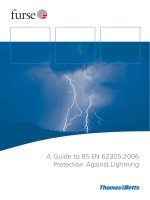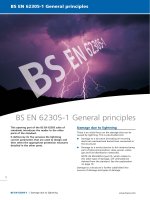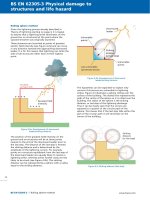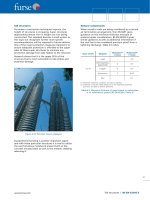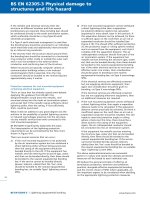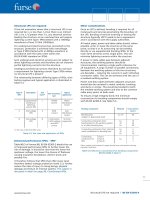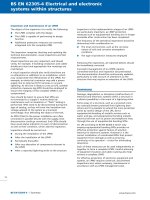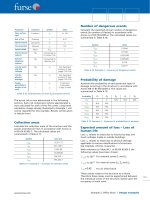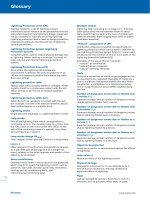Bsi bs en 01253 4 2016
Bạn đang xem bản rút gọn của tài liệu. Xem và tải ngay bản đầy đủ của tài liệu tại đây (845.54 KB, 12 trang )
BS EN 1253-4:2016
BSI Standards Publication
Gullies for buildings
Part 4: Access covers
BS EN 1253-4:2016
BRITISH STANDARD
National foreword
This British Standard is the UK implementation of EN 1253-4:2016. It
supersedes BS EN 1253-4:2000 which is withdrawn.
The UK participation in its preparation was entrusted to Technical
Committee B/505/11, Waste Fittings For Sanitary Appliances.
A list of organizations represented on this committee can be
obtained on request to its secretary.
This publication does not purport to include all the necessary
provisions of a contract. Users are responsible for its correct
application.
© The British Standards Institution 2016. Published by BSI Standards
Limited 2016
ISBN 978 0 580 90751 7
ICS 91.140.80
Compliance with a British Standard cannot confer immunity from
legal obligations.
This British Standard was published under the authority of the
Standards Policy and Strategy Committee on 31 May 2016.
Amendments issued since publication
Date
Text affected
BS EN 1253-4:2016
EN 1253-4
EUROPEAN STANDARD
NORME EUROPÉENNE
EUROPÄISCHE NORM
April 2016
ICS 91.140.80
Supersedes EN 1253-4:1999
English Version
Gullies for buildings - Part 4: Access covers
Avaloirs et siphons pour bâtiments - Partie 4:
Tampons/couvercles d'accès
Abläufe für Gebäude - Teil 4: Abdeckungen
This European Standard was approved by CEN on 14 February 2016.
CEN members are bound to comply with the CEN/CENELEC Internal Regulations which stipulate the conditions for giving this
European Standard the status of a national standard without any alteration. Up-to-date lists and bibliographical references
concerning such national standards may be obtained on application to the CEN-CENELEC Management Centre or to any CEN
member.
This European Standard exists in three official versions (English, French, German). A version in any other language made by
translation under the responsibility of a CEN member into its own language and notified to the CEN-CENELEC Management
Centre has the same status as the official versions.
CEN members are the national standards bodies of Austria, Belgium, Bulgaria, Croatia, Cyprus, Czech Republic, Denmark, Estonia,
Finland, Former Yugoslav Republic of Macedonia, France, Germany, Greece, Hungary, Iceland, Ireland, Italy, Latvia, Lithuania,
Luxembourg, Malta, Netherlands, Norway, Poland, Portugal, Romania, Slovakia, Slovenia, Spain, Sweden, Switzerland, Turkey and
United Kingdom.
EUROPEAN COMMITTEE FOR STANDARDIZATION
COMITÉ EUROPÉEN DE NORMALISATION
EUROPÄISCHES KOMITEE FÜR NORMUNG
CEN-CENELEC Management Centre: Avenue Marnix 17, B-1000 Brussels
© 2016 CEN
All rights of exploitation in any form and by any means reserved
worldwide for CEN national Members.
Ref. No. EN 1253-4:2016 E
BS EN 1253-4:2016
EN 1253-4:2016 (E)
Contents
Page
European foreword....................................................................................................................................................... 3
1
Scope .................................................................................................................................................................... 4
2
Normative references .................................................................................................................................... 4
3
Terms and definitions ................................................................................................................................... 4
4
Classification ..................................................................................................................................................... 4
5
Materials............................................................................................................................................................. 5
6
6.1
6.2
6.3
6.4
6.5
6.5.1
6.5.2
6.5.3
6.5.4
6.5.5
Design and construction ............................................................................................................................... 5
General requirements ................................................................................................................................... 5
Appearance........................................................................................................................................................ 5
Clear opening of access covers for man entry....................................................................................... 5
Edge protection for access covers of reinforced concrete................................................................ 5
Tightness ............................................................................................................................................................ 6
General ................................................................................................................................................................ 6
Watertightness: Class Wt.............................................................................................................................. 6
Odourtightness: Class Ot............................................................................................................................... 6
Backflow tightness: Class Bt ........................................................................................................................ 6
Additional requirements .............................................................................................................................. 6
7
7.1
7.2
7.3
7.3.1
7.3.2
7.3.3
Test methods .................................................................................................................................................... 6
Loading test ....................................................................................................................................................... 6
Appearance and dimensions ....................................................................................................................... 6
Tightness ............................................................................................................................................................ 6
Watertightness ................................................................................................................................................. 6
Odourtightness ................................................................................................................................................ 6
Backflow tightness .......................................................................................................................................... 7
8
Marking ............................................................................................................................................................... 7
9
Evaluation of conformity .............................................................................................................................. 7
2
BS EN 1253-4:2016
EN 1253-4:2016 (E)
European foreword
This document (EN 1253-4:2016) has been prepared by Technical Committee CEN/TC 165 “Waste
water engineering”, the secretariat of which is held by DIN.
This European Standard shall be given the status of a national standard, either by publication of an
identical text or by endorsement, at the latest by October 2016, and conflicting national standards shall
be withdrawn at the latest by October 2016.
Attention is drawn to the possibility that some of the elements of this document may be the subject of
patent rights. CEN [and/or CENELEC] shall not be held responsible for identifying any or all such patent
rights.
This document supersedes EN 1253-4:1999.
This is the fourth part in EN 1253, a series of standards relating to different types of floor gullies, roof
drains and access covers for drainage systems inside buildings. The EN 1253 series under the main title
Gullies for buildings actually consists of the following parts:
— Part 1: Trapped floor gullies with a depth water seal of at least 50 mm;
— Part 2: Roof drains and floor gullies without trap;
— Part 3: Evaluation of conformity;
— Part 4: Access covers;
— Part 5: Gullies with light liquids closure.
Since the latest versions of EN 1253-4 the most significant technical changes are the following:
a) introduction of the new standards on trapped floor gullies with a depth of water seal of at least
50 mm (EN 1253-1), roof drains and floor gullies without trap (EN 1253-2) and on evaluation of
conformity (EN 1253-3);
b) amendment of items of marking as well as methods of marking.
According to the CEN/CENELEC Internal Regulations, the national standards organizations of the
following countries are bound to implement this European Standard: Austria, Belgium, Bulgaria,
Croatia, Cyprus, Czech Republic, Denmark, Estonia, Finland, Former Yugoslav Republic of Macedonia,
France, Germany, Greece, Hungary, Iceland, Ireland, Italy, Latvia, Lithuania, Luxembourg, Malta,
Netherlands, Norway, Poland, Portugal, Romania, Slovakia, Slovenia, Spain, Sweden, Switzerland,
Turkey and the United Kingdom.
3
BS EN 1253-4:2016
EN 1253-4:2016 (E)
1 Scope
This European Standard classifies access covers according to their loading strength and specifies
requirements relating to their design, construction, marking, testing and evaluation of conformity.
This European Standard classifies and specifies requirements for factory made access covers used for
drainage systems inside buildings. This European Standard does not apply to access covers intended for
external use which are covered by EN 124 series.
2 Normative references
The following documents, in whole or in part, are normatively referenced in this document and are
indispensable for its application. For dated references, only the edition cited applies. For undated
references, the latest edition of the referenced document (including any amendments) applies.
EN 124 (all parts), Gully tops and manhole tops for vehicular and pedestrian areas
EN 476, General requirements for components used in drains and sewers
EN 1253-1:2015, Gullies for buildings — Part 1: Trapped floor gullies with a depth water seal of at least
50 mm
EN 1253-2:2015, Gullies for buildings — Part 2: Roof drains and floor gullies without trap
EN 1253-3, Gullies for buildings — Part 3: Evaluation of conformity
3 Terms and definitions
For the purposes of this document, the terms and definitions given in the EN 124 series,
EN 1253-1:2015 and the following apply.
3.1
access cover
assembly providing access to chamber, gully, shaft or pipe, capable of installation at floor level,
generally consisting of a cover and frame
3.2
cover
removable part of an access cover
3.3
frame
fixed part of an access cover which receives and supports a cover
3.4
seating
surface on which the cover rests in the frame
4 Classification
Access covers are classified by loading strength when tested in accordance with 7.1, into the following
classes: H 1,5, K 3, L 15, R 50, M 125, N 250, P 400.
A guide for selecting the class of an access cover appropriate to the place of installation is given below.
The selection of the appropriate class is the responsibility of the specifier.
4
BS EN 1253-4:2016
EN 1253-4:2016 (E)
a) Class H 1,5: Areas where no load is expected.
b) Class K 3:
buildings.
Areas without vehicular traffic, such as dwellings, commercial and some public
c) Class L 15: Areas with light vehicular traffic, such as in commercially used premises and public
areas.
d) Class R 50: Areas with vehicular traffic, such as in commercially used premises and factories.
e) Class M 125: Areas with vehicular traffic, such as car parks, factories and workshops.
f)
Class N 250: Heavy duty industrial areas subject to forklift traffic, such as food processing areas,
chemical or process plants.
g) Class P 400: Extra-heavy duty applications including food processing areas, chemical or process
plants, where gullies are subjected to industrial forklift trucks and/or where heavy vehicles are
manoeuvring.
Classes E 600 and F 900 gully tops conforming to the EN 124 series may be used for all areas subject to
special stresses such as exhibition halls, market halls, factory sheds and aircraft hangars.
The selection of the appropriate class is the responsibility of the designer. Where there is doubt of the
class to be used, the next highest class should be selected.
5 Materials
The materials used shall withstand the stresses likely to occur during installation and operation and
shall comply with the requirements specified in Clause 6, such that there shall be no deformation of the
access cover or other damage likely to impair function or cause injury to health.
6 Design and construction
6.1 General requirements
Access covers shall be designed and manufactured to ensure their function and the compatibility of
seatings between frame and cover. Cushioning inserts may be used.
When in position, it shall not be possible for covers to be dislodged from the frame, but they shall be
easy to open. The upper surfaces of frame and cover shall be flush.
6.2 Appearance
Access covers shall be free from sharp edges and imperfections (e.g. bubbles, cracks or unevenness)
which could impair functioning or cause injury to people.
6.3 Clear opening of access covers for man entry
The clear opening of access covers designed for man entry shall comply with the provisions of EN 476
and the safety requirements in force at the place of installation.
6.4 Edge protection for access covers of reinforced concrete
For reinforced concrete access covers, the edges and contact surfaces of the seating between frame and
cover shall be protected with hot-dip galvanized steel or cast iron or materials of equivalent properties.
5
BS EN 1253-4:2016
EN 1253-4:2016 (E)
6.5 Tightness
6.5.1 General
Where tightness is required it shall be tested in accordance with 7.3. There are three classes of tightness
as follows:
6.5.2 Watertightness: Class Wt
Watertight access covers shall prevent the ingress of surface water which does not exert hydrostatic
pressure when tested in accordance with 7.3.1. This can be achieved, for example, by providing a
mechanical connection of frame and cover or by way of an appropriate design of these components.
6.5.3 Odourtightness: Class Ot
Odourtight access covers shall prevent the escape of foul air. Odourtightness is assumed if the access
cover is tight when tested in accordance with 7.3.2.
6.5.4 Backflow tightness: Class Bt
Backflowtight access covers shall, in the event of surcharge in the drainage system, prevent backflow, at
a pressure of up to 50 kPa (0,5 bar) of water from escaping from the access cover when tested in
accordance with 7.3.3; they shall also be watertight in accordance with 6.5.2 and odourtight in
accordance with 6.5.3.
6.5.5 Additional requirements
If a higher tightness is required, e.g. for toxic and/or explosive gases, the design and the test methods
shall be agreed between the manufacturer and user.
If an additional inner cover is provided for sealing purposes, the outer cover shall be designed to
restrict water ingress. Water that has penetrated through the top cover shall not collect on the inner
cover, but shall be drained.
7 Test methods
7.1 Loading test
Access covers shall be subjected to a loading test as specified in EN 1253-1:2015, 5.6, or
EN 1253-2:2015, 5.3, in order to establish their class.
7.2 Appearance and dimensions
The requirements specified in 6.2, 6.3 and 6.4 shall be checked by visual examination. Dimensions shall
be measured to an accuracy of ± 1 mm.
7.3 Tightness
7.3.1 Watertightness
The access cover shall be flooded with a (10 ± 1) mm head of water for a period of (15 ± 1) min. The test
shall be deemed to have been passed if, during this period, no water has penetrated to the underside.
7.3.2 Odourtightness
The access cover shall be subjected from below to a hydrostatic pressure of ≥ 500 Pa (≥5 mbar). The
test shall be deemed to have been passed if, over a period of (15 ± 1) min, no water has escaped at any
point.
6
BS EN 1253-4:2016
EN 1253-4:2016 (E)
7.3.3 Backflow tightness
A mechanical connection shall be made between frame and cover and a hydrostatic pressure of ≥ 50 kPa
(≥0,5 bar) applied from below. The test shall be deemed to have been passed if, over a period of
(15 ± 1) min, no water has escaped.
8 Marking
Access covers and their components shall bear the following clear and durable markings, for example,
cast on, by engraving, painting, stamping or labelling (including electronic recognition labelling) as
indicated in Table 1:
a) EN 1253-4;
b) identification of loading and tightness class (e.g. M 125 Bt) or by frames used for different classes
(e.g. L 15 – M 125 Bt);
c) name and/or mark of the manufacturer;
d) identification of independent certification body, where applicable;
e) period of manufacture (coded or not).
Table 1 — Location of marking of access covers
Itemd
Frame
Cover
Packaging
Name and/or mark of manufacturer
Xa
X
Xa
X
-
-
X
EN 1253-4
Period of manufacture
Load class
Tightness classc
a
b
c
d
If possible.
Xa,b
Xa
X
Xa,b
Xa
X
X
X
For the classes H and K the marking is optional.
Where applicable.
Further marking may be added (e.g. for the application). The marking shall be visible,
where possible, after the access cover is installed.
If the application of the marking would be detrimental to the production and/or functioning of the
product, the marking shall be included on the packaging.
9 Evaluation of conformity
The evaluation of conformity shall be carried out as given in EN 1253-3.
7
This page deliberately left blank
This page deliberately left blank
NO COPYING WITHOUT BSI PERMISSION EXCEPT AS PERMITTED BY COPYRIGHT LAW
British Standards Institution (BSI)
BSI is the national body responsible for preparing British Standards and other
standards-related publications, information and services.
BSI is incorporated by Royal Charter. British Standards and other standardization
products are published by BSI Standards Limited.
About us
Revisions
We bring together business, industry, government, consumers, innovators
and others to shape their combined experience and expertise into standards
-based solutions.
Our British Standards and other publications are updated by amendment or revision.
The knowledge embodied in our standards has been carefully assembled in
a dependable format and refined through our open consultation process.
Organizations of all sizes and across all sectors choose standards to help
them achieve their goals.
Information on standards
We can provide you with the knowledge that your organization needs
to succeed. Find out more about British Standards by visiting our website at
bsigroup.com/standards or contacting our Customer Services team or
Knowledge Centre.
Buying standards
You can buy and download PDF versions of BSI publications, including British
and adopted European and international standards, through our website at
bsigroup.com/shop, where hard copies can also be purchased.
If you need international and foreign standards from other Standards Development
Organizations, hard copies can be ordered from our Customer Services team.
Subscriptions
Our range of subscription services are designed to make using standards
easier for you. For further information on our subscription products go to
bsigroup.com/subscriptions.
With British Standards Online (BSOL) you’ll have instant access to over 55,000
British and adopted European and international standards from your desktop.
It’s available 24/7 and is refreshed daily so you’ll always be up to date.
You can keep in touch with standards developments and receive substantial
discounts on the purchase price of standards, both in single copy and subscription
format, by becoming a BSI Subscribing Member.
PLUS is an updating service exclusive to BSI Subscribing Members. You will
automatically receive the latest hard copy of your standards when they’re
revised or replaced.
To find out more about becoming a BSI Subscribing Member and the benefits
of membership, please visit bsigroup.com/shop.
With a Multi-User Network Licence (MUNL) you are able to host standards
publications on your intranet. Licences can cover as few or as many users as you
wish. With updates supplied as soon as they’re available, you can be sure your
documentation is current. For further information, email
BSI Group Headquarters
389 Chiswick High Road London W4 4AL UK
We continually improve the quality of our products and services to benefit your
business. If you find an inaccuracy or ambiguity within a British Standard or other
BSI publication please inform the Knowledge Centre.
Copyright
All the data, software and documentation set out in all British Standards and
other BSI publications are the property of and copyrighted by BSI, or some person
or entity that owns copyright in the information used (such as the international
standardization bodies) and has formally licensed such information to BSI for
commercial publication and use. Except as permitted under the Copyright, Designs
and Patents Act 1988 no extract may be reproduced, stored in a retrieval system
or transmitted in any form or by any means – electronic, photocopying, recording
or otherwise – without prior written permission from BSI. Details and advice can
be obtained from the Copyright & Licensing Department.
Useful Contacts:
Customer Services
Tel: +44 845 086 9001
Email (orders):
Email (enquiries):
Subscriptions
Tel: +44 845 086 9001
Email:
Knowledge Centre
Tel: +44 20 8996 7004
Email:
Copyright & Licensing
Tel: +44 20 8996 7070
Email:
